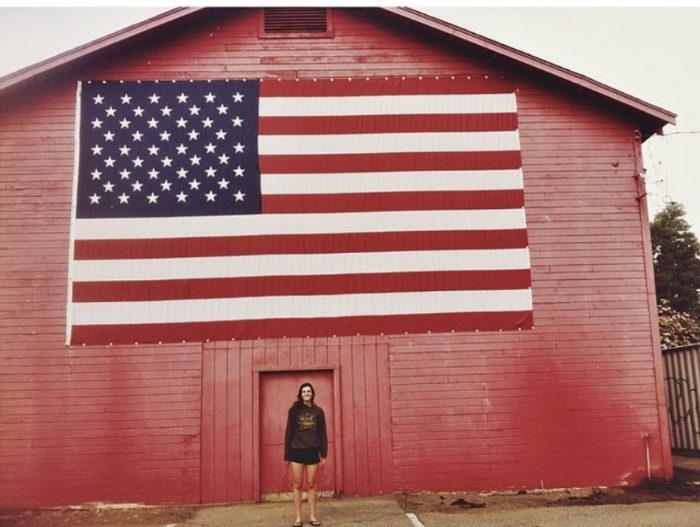Coming of age in 21st century America is disorienting, to say the least.
It’s disorienting to hear people of an older generation describing this year as the strangest time they have ever lived through; while as millennials, this is the only reality we have ever known.
The benchmark beginning of political socialization for American millennials began with 9/11, or at least it did for me. Before September 11th, 2001, I had no memory of American news media. I had no knowledge of that fearful word “terrorist” that we would all come to know so well, and little inclination that others throughout the world lived in a reality much different from my own.
That was the beginning, the first chapter of the young millennial-American book of political ideology that my generation was anticipated to adopt. That was the first time I watched the news, at six years old. The first time I felt distinctly “American” and began to absorb the popularized sentiments and definition of what that means. The first time anyone told me there were people out there, far away in a place called the Middle East that hated us, because we are Americans. I was told they were the enemy, the other, the evil ones who wanted to kill us, or at least that’s how I remembered hearing it in kindergarten.
As Americans (or at least white Americans), we are told from a young age what it means to be American. How it is a pleasure and a privilege to be a member of the greatest country in the world. How we are the good guys, and we are important because there are lots and lots of bad guys out there that want the good guys dead. But don’t worry kid, we have something called nuclear weapons and way more guns than them. That’s how the good guys always win.
Growing up in a conservative community throughout the Bush era, I knew nothing different than my country being at war in the Middle East. This was normal, and not only normal, but it was also justifiable and “noble.” I was told it was to protect our safety as Americans. I was told that America had no choice but to intervene through war in the Middle East in order to bring the almighty gift of peace and democracy to the world.
I was told it is our distinguished role as Americans, ordained by God. We are a benevolent force of good on earth and the pristine, hailing example of democracy. It is our holy duty to bring this gift, through bombs and bloodshed to the suffering and oppressive un-Westernized world.
The first presidential election I was eligible to vote in came along in 2016. Although I had lived through several other elections, I was always told who were the good guys and who were the bad guys. I paid little attention to politics as a whole because to me, as a teenager in America, what was there to pay attention to? But the ongoing narrative I was fed contained an unwavering support of the American political system as a whole. A sincere belief in the merit of democracy and the optimistic heart that the government, while they may disagree along party lines, was working together for the good of the governed masses.
This is the narrative that permeated my upbringing. In 2016, popular sentiments began to shift, and I could feel that. We all could feel that. Standing in the aftermath of the results of the 2016 election, I was disoriented, afraid, embarrassed, but still optimistic. Optimistic in America, or more accurately, optimistic in the overall good of individual people. This is a feeling I fight to maintain today.
This was the narrative I inherited, and I know that not everyone inherited the same narrative I did. Coming of age in America means hearing these stories; the ones that inspire us, scare us, and indoctrinate us as young, moldable little humans. But they are simply that—stories. Narratives, not truths, not absolutes. Now it is our time to decide for ourselves which stories were real, which were euphemisms, which were lies, and which ones fall (as they almost always do) at some undetermined place in between.
It is a scary place to be when you begin to let your fingers slip off the branch of certainty and let go of the beliefs that you were once convinced defined who you are. Let’s embrace the sanctity of the unknowing and dive deep into the unending questions that make life interesting and worth engaging with in the first place.
We are a generation and a country at war within ourselves. We are a population broken and bewildered by the nastiness of aggressive political bipartisanship. We are a people losing faith—in government, in economics and free markets, in each other, and most devastatingly, in ourselves. So it is here, on the brink of a disheartening presidential election, in the midst of a global pandemic, during a time of absolute civil unrest and revolt that I am left wondering how the f*ck we got here. I believe it is the responsibility of each of us to question and investigate everything.
I am terrified by the fierce allegiance of people, both young and old, to a single, sharp, and obstinate political party. I’m alarmed by the overwhelming energy of anger and hate that I feel permeated through American culture and society. I am disillusioned by the conflicting, confusing, and irrational narratives force-fed to us by the corporately controlled mainstream media outlets.
Now more than ever it is profusely difficult to untangle truth from distortion and honesty from manipulation. We are a generation losing the ability to do and think freely for ourselves. Our minds have been overwhelmed from a young age with such uncontrollable amounts of information from technology and influence from social media that we are left with nothing else than a sense of bewildering disillusion.
The social, political, and ideological teams we align ourselves with are given the absolute ability to draft our moral and ethical beliefs for us. All we can do is give in to the mainstream narrative, or be bullied by the opposing side and slandered with hate speech until we eventually succumb to the demands of the popular group. We are told what to think, what to say (and more importantly, what never to say), who to hate, who to exonerate, and what is and is not morally just. We are offered only two options, who is with us, and who is against us. Us and them. The righteous and the unrighteous. The members of either camp are typically irrefutable in their thinking.
This type of dualistic thinking simply does not work for me, and I believe my feeling is shared by many, many other confused, depressed, repressed, passionate, intelligent young people. It is the voices shouting at the top of their lungs that Trump only divides us, while simultaneously blocking any voices that dissent from their ever-changing narrative of self-righteous “wokeness.”
It is Trump supporters’ unwavering and disturbing allegiance to a man and a movement that goes so far beyond the executive office that there is no clear line where it ends. We have eroded the distinction between personal identity and political alignment so far that we see each other as members of a team; not as individual, complex, sacred human beings with stories to be told.
So I am on a mission. To question everything and decide for myself what I do and do not believe to be real or true. I admit that I do not know it all, not even close, and I understand that all of life is one great experiment of learning. The more I learn, the more I see that there is to learn.
I’m on a mission to give space to all voices and experiences, wherever the hell you come from and however the hell that shaped your worldview.
But above all, I am on a mission to build bridges where they have been torn down. To offer listening before speaking, to encourage conversation over shouting, and to always be open to reassessing, reworking, and reevaluating my beliefs in order to become a more empathetic, open, and loving human being.
~











Read 2 comments and reply